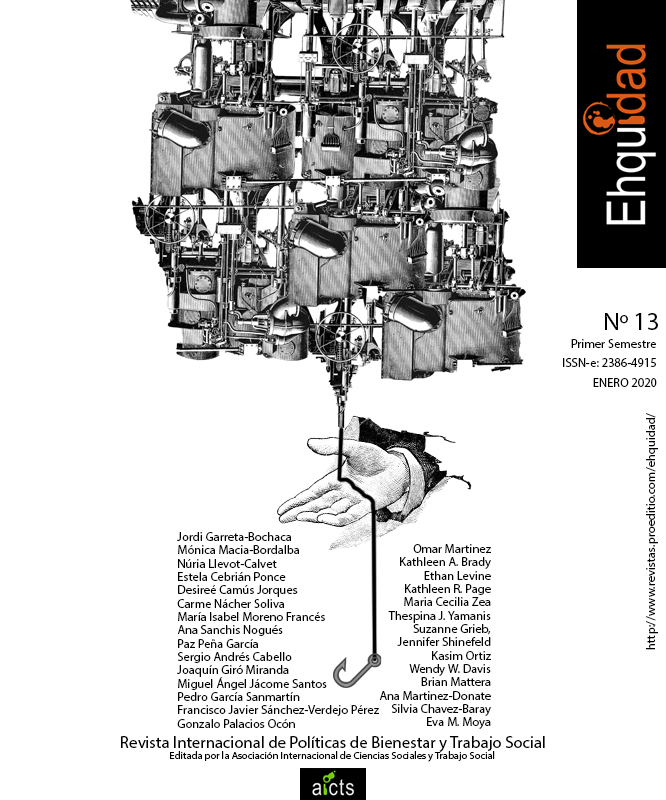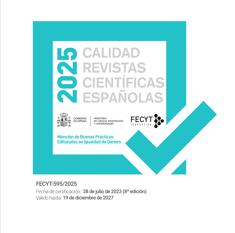Romi and feminism: a movement without dissecting
DOI:
https://doi.org/10.15257/ehquidad.2020.0003Abstract
Gender and cultural specificity assumes taking into account those characteristics that cause the opportunities of Roma women to be diminished with respect to the population in general and to the men of their community. Society must set in motion a series of guarantees to address specific problems, understanding that the starting point is not identical for all women and therefore the road to travel can and should be adapted to any circumstance. Nowadays Romi in Spanish society, as ethnic-cultural group, suffer a different situation with respect to men. It is affected by multiple discrimination: for being women in a patriarchal society and for belonging to an ethnic minority that, according to social prejudice studies, receives the worst social assessment. The devaluation of women as a social group translates into discrimination by sex, a universal fact common to all women, even when attempts at domination are so subtle that they are not aware of them. The multiple discrimination of Romi is given by their belonging to the feminine gender and to a socially excluded group.
Downloads
References
Alfaro, A. (1993). La gran redada de Gitano. Colección Interface, 2. Madrid, Presencia Gitana.
Alfaro, A. (2009). Escritos sobre gitanos. Barcelona, Asociación Enseñantes con gitanos.
Anzaldúa, G. (1987). Bordelands/La Frontera: La nueva mestiza. Madrid, Editorial. Traficantes de sueños.
Amorós, C. (1997). Tiempo de feminismo. Sobre feminismo, proyecto ilustrado y postmodernidad. Madrid, Cátedra. Feminismos.
Barth, F. (1976). Introducción. En F. Barth (comp.), Los grupos étnicos y sus fronteras (pp. 9-49). México D.F., Fondo de cultura Económica.
Basch L., Glick Schiller N., et al. (Eds.). (1994). Nations Unbound: Transnational Projects, Postcolonial Predicaments, and Deterritorialized Nation-States. London, Gordon and Breach.
Beck, U. (2000). What is globalization? Cambridge: Polity Press.
Castell, M. (1999). La Era de la Información. Economía, sociedad y cultura. 3 Vols. México D.F., Siglo XXI Editores.
Cho, S., Crenshaw, K., y Mccall, L. (2013). Toward a Field of Intersectionality Studies: Theory, Applications, and Praxis. Signs 38, 785-810.
Crenshaw, K. (2012). Cartografiando los márgenes. Interseccionalidad, políticas identitarias y violencia contra las mujeres de color. En L. R. Platero Méndez (Ed.), Intersecciones. Cuerpos y sexualidades en la encrucijada (pp. 87-122). Traducción al español por Lucas Platero y Javier Sáez. Barcelona, Bellaterra.
Colom, F. (1992). Razones de identidad. Pluralismo cultural e integración política. Capitulados 235-283. Barcelona, Anthropos Editorial.
Consejo de Europa. (1993). Los Gitanos en Europa: papel de las Autoridades Locales y Regionales. Resolución 249. En Minorías gitanas en Europa. Madrid, Fundación Encuentro.
De Sousa Santos, B. (2014). Derechos Humanos, democracia y desarrollo. Bogotá, Edición Antropos.
Dietz G. (2012). Multiculturalismo, interculturalidad y diversidad en educación. Una aproximación antropológica. México D.F., Fondo de Cultura Económica.
Fraser, N. (1996) Redistribución y reconocimiento: hacia una visión integrada de justicia del género. Revista Internacional de Filosofía Política, 8, 18-40.
García Canclini, N. (1999). La globalización imaginada. Barcelona, Paidós.
Habermas, J. (1999). La inclusión del otro. Buenos aires, Paidós.
Hernández, R. y Suárez, L. (2008). Descolonizando el Feminismo. Teorías y Prácticas desde los Márgenes. Madrid, Cátedra.
Jelin, E. (2005). ¿Ciudadanía emergente o exclusión? Movimientos sociales y ONGs en los noventa. Buenos Aires, CLACSO, Consejo Latinoamericano de Ciencias Sociales.
Macall (2005). The complexity of intersectionality. Signs, 30, 1771-1800.
McAdam, D. (1998). Orígenes conceptuales, problemas actuales y decisiones futuras, en Tejerina, B. e Ibarra, P., Movimientos Sociales. Transformaciones políticas y cambio cultural. Madrid, Trotta.
Mohanty, Ch. (2008). Bajo los ojos de Occidente: academia feminista y discursos coloniales, en Suárez Navaz, L. y Hernández, R. (Eds.) Descolonizando el feminismo. Teorías y prácticas desde los márgenes, Madrid, Cátedra.
Mora y Pereyra. (1999). Mujeres y solidaridad. Estrategias de supervivencia en el África subsahariana. Madrid, Los Libros de la Catarata.
Peña, P. (2017). El asociacionismo Romaní en Europa como nuevo intermediario entre los Estados-naciones, las Instituciones supra-nacionales y las comunidades gitanas. (Tesis Doctoral). Universidad de Granada, Facultad de Ciencias de la Educación.
Rodríguez, I. (2012). Las Estrategias nacionales de inclusión de la población gitana. De la agenda política a las “acciones concretas”. A Fondo, 61-62.
San Román, T. (1997). La diferencia inquietante. Viejas y nuevas estrategias culturales de los Gitanos. Madrid, Ed. XXI de España Editores, S.A.
Schiller, N.G., Basch, L., y Blanc-szanton, C. (1992). Towards a Definition of Transnationalism: Introductory-Remarks and Research Questions. In N.G.
Schiller, L., Basch & C., Blanc-szanton, (Eds.), Towards a transnational perspective on migration: Race, class, ethinicity and transnacionalism reconsidered (pp. ix-xiv). New York, NY, The New York Academy os Sciencies.
Touraine, A. (1998). Un mundo globalizado y fragmentado. En J. Calo, Topografías del mundo contemporáneo (pp. 63-84). Madrid, Fundación Argentaria y Ediciones Encuentro.












